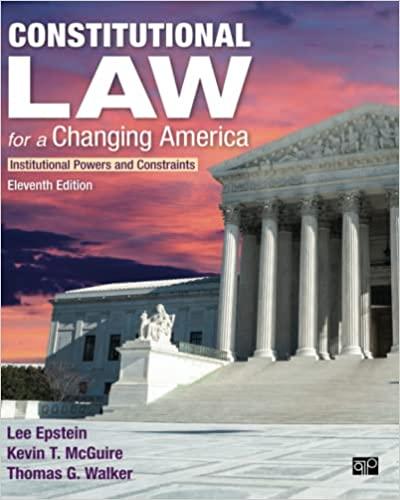Question
Critical Legal Thinking Case CHAPTER 4 4.1 Minor Harun Fountain, a minor, was shot in the back of the head at point-blank range by a
Critical Legal Thinking Case CHAPTER 4
4.1 Minor Harun Fountain, a minor, was shot in the back of the head at point-blank range by a playmate. Fountain required extensive lifesaving medical services from a variety of medical service providers, including Yale Diagnostic Radiology. The expense of the services rendered by Yale to Fountain totaled $17,694. Yale billed Vernetta TurnerTucker (Tucker), Fountain's mother, for the services. Tucker, however, declared bankruptcy and had Yale's claim against her discharged in bankruptcy. Tucker, on behalf of Fountain, sued the boy who shot Fountain and recovered damages in a settlement agreement. These funds were placed in an estate on Fountain's behalf under the supervision of the probate court. Yale filed a motion with the probate court for payment of the $17,694 from the estate. The probate court denied the motion. Yale appealed to the trial court, which held in favor of Yale. The trial court held that minors were liable for their necessaries. Fountain's estate appealed. Is Fountain's estate liable to Yale under the doctrine of necessaries? Yale Diagnostic Radiology v. Estate of Fountain, 838 A.2d 179, 2004 Conn. Lexis 7 (Supreme Court of Connecticut, 2004).
REFERENCES
Schlageter III, John J.; Cheeseman, Henry R.; Reed, Kathleen. Contract Law for Paralegals (p. 111). Pearson Education. Kindle Edition.
Critical Legal Thinking Case
4.3 Ratification Charles Edwards Smith, a minor, purchased an automobile from Bobby Floars Toyota (Toyota). Smith executed a security agreement to finance part of the balance due on the purchase price, agreeing to pay off the balance in 30 monthly installments. Smith turned 18, which was the age of majority in his state. Smith made 10 monthly payments after turning 18. He then decided to disaffirm the contract and stopped making the payments. Smith claims that he may disaffirm the contract entered into when he was a minor. Toyota argues that Smith has ratified the contract since attaining the age of majority. Who is correct? Bobby Floars Toyota, Inc. v. Smith, 269 S.E.2d 320 (N.C. Ct. App. 1980).
REFERENCES
Schlageter III, John J.; Cheeseman, Henry R.; Reed, Kathleen. Contract Law for Paralegals (p. 111). Pearson Education. Kindle Edition.
Step by Step Solution
There are 3 Steps involved in it
Step: 1

Get Instant Access to Expert-Tailored Solutions
See step-by-step solutions with expert insights and AI powered tools for academic success
Step: 2

Step: 3

Ace Your Homework with AI
Get the answers you need in no time with our AI-driven, step-by-step assistance
Get Started


